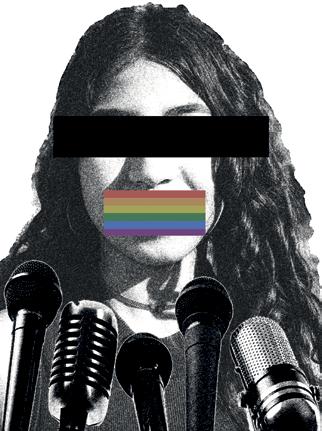
2 minute read
We feel seen but not heard: UP&Out and queer students on a lack of representation
from 24 October 2022 Issue 10 Year 84
by PDBY - Official student newspaper of the University of Pretoria

Ayesha Osman
Advertisement
The presence of the queer community has seen a rise in the past few decades, and inclusion is slowly becoming a reality. However, the queer students at the University of Pretoria feel “seen and not heard”. This is a reality for UP’s official queer society UP&Out. PDBY has interviewed the chairperson, Kherina Narotam, and a few queer students to gain insight into the university’s efforts to represent its queer students.
UP&Out’s perspective:
When asked about the representation of UP&Out by the university and any university-affiliated organisations and social media pages, Narotam Narotam responded: “They [the University of Pretoria] just allow us to exist.” According to Narotam, the society registers every year like any other society, and it is a common misconception that the university endorses the society; this, is not the case. “We often partner with and endorse the CSA&G (Centre for Sexualities, AIDS, and Gender). They help us tremendously; we rely on them for many things, and without them, the society would not have enjoyed the success it has since acquired. They provide us with everything we need and are even gracious enough to give us office space in the building.” She then raised the point: “The university makes decisions about the rights of queer students and consults us afterwards to promote their ideas. For example, UP&Out was not consulted on the creation of the Trans-micro site. Although this is a great initiative, the University made it out as though UP&Out had an input. We did not. We were simply invited to the celebration of its launch.” Lastly, she thanked the societies that support UP&Out, such as TUKS 4 Climate Justice, debate society, a few religious societies, the disability unit, TEDX and ManDown. She also stated: “We would appreciate more representation, but it is not something we expect or feel we are entitled to.”
Narotam was asked what the university can do to ensure that representation and the needs of queer people are satiated. She replied: “We would appreciate if the university consulted us [UP&Out] on their plans. We have suggestions and solutions, but they do not really care too much about what we have to say. Taking a more humanistic rather than political approach to queer rights may help change a few of the substantive issues experienced by our members daily.” She further stated that despite the university’s efforts for inclusivity and representation, like with the establishment of the two gender-neutral bathrooms on Hatfield Campus and the implementation of the Trans-Protocol, there is a lack of queer safe spaces on all campuses. “The university can thus ensure that its anti-discrimination policies are implemented on all levels of the institution with visible change. Subsequently, leading to the creation of queer safe spaces for students and UP employees alike at our campuses - including the establishment of genderneutral bathrooms not just in a single area of campus, and certainly not just one campus,” stated Narotam.
A queer students’ perspective:
As much as UP&Out is the only queer society on campus, multiple queer students do not know of the society or simply do not attend their events or initiatives. PDBY has sought out the opinions of students outside of UP&Out to ensure that their voices are heard,





